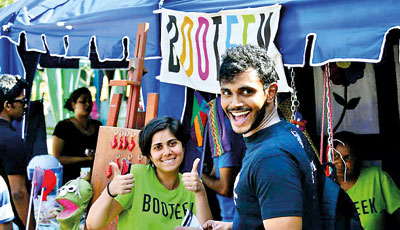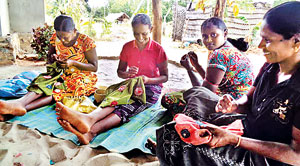Building a family of social entrepreneurs

Bootek: Markets needlework products made by women from the low income bracket. Pics courtesy of Social Enterprise Lanka, The Good Market and Sari Connection
Social Enterprise Lanka’s vision sounds simple enough on paper – to have a vibrant social entrepreneurship sector in Sri Lanka by 2025 – but like with anything worthwhile, it comes equipped with its fair share of challenges. Social Enterprise Lanka isn’t daunted by this and the company’s enthusiasm to fostering a culture conducive for local social entrepreneurs and the commitment of the partners it works with is admirable.
The definition of a social entrepreneur is one that is in flux but there are certain anchors to which it is moored. While entrepreneurship acts as a catalyst in the business landscape, social entrepreneurship acts as a social catalyst and a change agent. “Fundamentally a social enterprise is an entity that is meant to solve a core social or environmental problem – what we call creating a social and environmental impact,” explains Eranda Ginige, co-founder of Social Enterprise Lanka (SEL). A social enterprise trades products or services and is run in a similar manner to a revenue generating business, only their core purpose is not for profit but creating a socio-economic impact. The short version of social entrepreneurship? Profit with a social or environmental purpose.
The clarion call to arms for stronger social entrepreneurship is one that is gathering momentum and around the world, varying countries are at varying degrees of social entrepreneurship. When working at the British Council for over seven years, the first half of Eranda’s career was devoted to the development of entrepreneurship in the social sector. It was this work which stoked a desire to immerse himself in the sector and Social Enterprise Lanka began last year along with co-founder Anoka Abeyrathne, in order to rally Sri Lanka’s social entrepreneurs through a local body and work towards building an eco-system which enables social entrepreneurs.
In Sri Lanka, the practice and history of social entrepreneurship precedes the business lexicon and theory attached to it. Dr.Amanda Kiessel, co-founder of the Good Market,points out that the use of the term ‘social enterprise’ in Sri Lanka is new but the concept is old. There are a lot of organizations in Sri Lanka that have been doing this type of work for a really long time. “While many Sri Lankan social enterprises have been in operation for many years, it’s only recently that a community has started to emerge. It’s been really exciting to see enterprises come together to discuss common challenges or opportunities for partnership,” she noted via email.
SEL is at a nascent stage but has been active in attempting to create a community of social entrepreneurs and forging lateral partnerships. SEL takes a four pronged approach to its work, helping enterprises organize, support and measure their work while rewarding and recognizing their achievements. Workshops have been conducted to help prepare business models and help measure socio-economic impact – key for any social enterprise’s survival. Knowledge sharing is at the crux of their activities at the moment and apart from its regular workshops and assistance with IT and legal advice, SEL is currently gearing up for the next edition of its partnership with Social Starters, a UK-based social enterprise. The partnership connects selected Sri Lankan social enterprises with international consultants for a period of time, helping the enterprises address specific needs.
It’s interesting to note that while a number of people operate along the lines of a social enterprise and fit into the category, most are yet to self-identify as social entrepreneurs. In order to create its aspirational community, it is evident that the bulk of SEL’s work will need to take place on a grass root level, raising awareness among various stakeholders.There’s a distinction between charities, corporate philanthropy and entrepreneurial altruism which needs to be clarified clearly in the minds of the public in order for SEL to achieve its formidable vision.

Sari Connection: Working with women in the North
Anam Omar of Booteek, first encountered SEL in November last year through a series of workshops it conducted about the essentials of running a social enterprise. Booteek markets needlework products made by a collective of women from Sri Lanka’s low income bracket. Some of its craftswomen have adult children with special needs and for some, Booteek is the only source of income. For Booteek, SEL’s support has been a springboard in making the transition from being a charity model to a self-sustaining entity and also an opportunity for shared learning with other social entrepreneurs.
SEL’s latest initiative is the testing of waters for a potential online platform on wow.lk to connect social entrepreneurs with a larger audience (www.wow.lk/social enterprise). So far, the platform carries products by three social enterprises – Sari Connection, Rice and Carry and Booteek. ““We are thrilled with the response Booteek has been getting on wow.lk! Booteek’s customer base is largely based on word of mouth and hasn’t expanded much beyond that. But at wow.lk, we have completely unknown customers buying our products, which has been a super boost of confidence for Booteek and its collective of women as it is creating additional awareness for Booteek. An added bonus was the opportunity to collaborate with other social entrepreneurs that I met through SEL,” says Anam, elaborating about the partnership so far.
The online platform is the beginning of firsts –SEL is keen to kick-start a ‘Buy Social’ campaign, similar to one carried out in U.K. The campaign is self-explanatory – simply to encourage people to give priority to businesses which make a positive impact on society and for companies which do large procurements to offer added weightage and recognition for the social impact of these businesses.The Buy Social campaign is one of many grooves in SEL’s roadmap. For social entrepreneurs to firmly mark their territory on Sri Lanka’s business landscape, there are a few creases to be ironed out. The creation of a social stock exchange would help in achieving global standards of measurement (as adapted to suit local requirements) and gather the numbers required for a national social movement. In addition to the standard difficulties of running a business and reaching its financial goals, social entrepreneurs are also tasked with consistent impact measurement – making sure that the social and environmental goals are monitored and measured.
Another of SEL’s partners, Sari Connection works with around 70 women from both Jaffna and Mullaitivu and the lack of education about social entrepreneurs has been challenging. Natasha Yatawara of Sari Connection explains that demystifying the concept of upcycling (Sari Connection upcycles donated saris to handcraft innovative products)has been an obstacle in reaching out to the Sri Lankan market. “Our project aims to address an economic need with an environmentally positive approach and it’s a shame people don’t recognise it,” she explains. “Running a business that has a higher purpose – addressing a social need – than just being profit oriented is still not a model people are familiar with or have faith in self-sustaining. Hence the investment opportunities available for such initiatives are limited too.”
Dr Amanda Kiessel also notes that the lack of recognition when registering social enterprises in Sri Lanka can also be a barrier. Other countries recognize social enterprises as a hybrid between traditional non-profit organizations and businesses, granting access to special services and concessions. In addition to filing audited financial reports, companies are also required to file benefit reports that include their social/environmental contribution for the past year. As of now, there is no dedicated registration category for social enterprises in Sri Lanka and registering as a private company, guaranteed limited company or a cooperative is often an ill-fitting suit for the silhouette of a social enterprise.
Dr. Amanda notes that the growing community of social enterprises and supporting initiatives has been heartening. “Lanka Social Venture has an incubator for social enterprises and they provide coaching services. Social Enterprise Lanka has been supporting with training and awareness programmes and consulting. iProbono Sri Lanka provides legal aid to social enterprises. Lanka Impact Investment Network was recently started to support impact investment,” she concludes.
For SEL, the outlook is a largely optimistic one and the new generation of investors keen for financial returns as well as social and environment gains heralds a positive shift in perceptions for social entrepreneurs.


